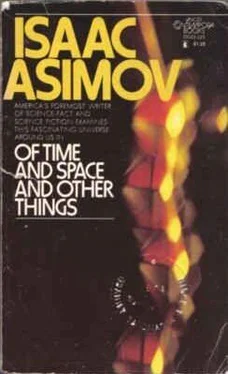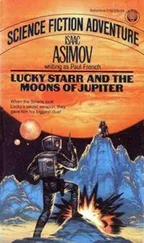Isaac Asimov - Of Time and Space and Other Things
Здесь есть возможность читать онлайн «Isaac Asimov - Of Time and Space and Other Things» весь текст электронной книги совершенно бесплатно (целиком полную версию без сокращений). В некоторых случаях можно слушать аудио, скачать через торрент в формате fb2 и присутствует краткое содержание. Год выпуска: 1972, ISBN: 1972, Издательство: Lancer Books, Жанр: Прочая научная литература, на английском языке. Описание произведения, (предисловие) а так же отзывы посетителей доступны на портале библиотеки ЛибКат.
- Название:Of Time and Space and Other Things
- Автор:
- Издательство:Lancer Books
- Жанр:
- Год:1972
- ISBN:ISBN: 0-447-33023-3
- Рейтинг книги:4 / 5. Голосов: 1
-
Избранное:Добавить в избранное
- Отзывы:
-
Ваша оценка:
- 80
- 1
- 2
- 3
- 4
- 5
Of Time and Space and Other Things: краткое содержание, описание и аннотация
Предлагаем к чтению аннотацию, описание, краткое содержание или предисловие (зависит от того, что написал сам автор книги «Of Time and Space and Other Things»). Если вы не нашли необходимую информацию о книге — напишите в комментариях, мы постараемся отыскать её.
Of Time and Space and Other Things — читать онлайн бесплатно полную книгу (весь текст) целиком
Ниже представлен текст книги, разбитый по страницам. Система сохранения места последней прочитанной страницы, позволяет с удобством читать онлайн бесплатно книгу «Of Time and Space and Other Things», без необходимости каждый раз заново искать на чём Вы остановились. Поставьте закладку, и сможете в любой момент перейти на страницу, на которой закончили чтение.
Интервал:
Закладка:
Isaac Asimov
Of Time and Space and Other Things
Introduction
As we trace the development of man over the ages, it seems in many respects a tale of glory and victory; of the develop ment of the brain; of the discovery of fire; of the building of cities and of civilizations; of the triumph of reason; of the fimng of the Earth and of the reaching out to sea and space.
But increasing knowledge leads not to conquest only, but to utter defeat as well, for one learns not only of new po tentialities, but also of new limitations. An explorer may discover a new continent, but he may also stumble over the world's end.
And it is so with mankind. We are distinguished from all other living species by our power over the inanimate universe; and we are distinguished from them also by our abject defeat by the inanimate universe, for we alone have learned of defeat.
Consider that no other species (as far as we know) can possess our concept of time. An animal may remember, but surely it can have no notion of "past" and certainly not of "future."
No non-human creature lives in anything but the present moment. No non-human creature can foresee the inevita bility of its own death. Only man is mortal, in the sense that only man is aware that he is mortal.
Robert Bums said it better in his poem To a Mouve.
He addresses the mouse, after turning up its nest with his plough, apologizing to it for the disaster he has brought upon it, and reminding it fatalistically that "The- best-laid schemes o' mice and men / Gang aft a-gley."
But then, in a final soul-chilling stanza (too often lost in the glare of the much more famous penultimate stanza about mice and men), he gets to the real nub of the poem and says:
"Still thou art blest compar'd wi' me!
"The present only toucheth thee:
"But oh, I backward cast my e'e
"On prospects drear!
"An' forward tho' I canna see,
"I guess an' fear!"
Somewhere, then, in the progress of evolution from mouse to man, a primitive hominid first caught and grasped at the notion that someday he would die. Every living crea ture died at last, our proto-philosopher could not help but notice, and the great realization somehow dawned upon him that he himself would do so, too. If death must come to all life, it must come to himself as well, and ahead of him he saw world's end.
We talk often about the discovery of fire, which marked man off from all the rest of creation. Yet the discovery of death', is surely just as unique and may have been just as driving a force in man's upward climb.
The details of both discoveries are lost forever in the shrouded and impenetrable fog of pre-history, but they appear in myths. The discovery of fire is celebrated most famously in the Greek myth of Prometheus, who stole fire from the Sun for the poor, shivering race of man.
And the discovery of death is celebrated most famously in the Hebrew myth of the Garden of Eden, where man first dwelt in the immortality that came of the ignorance of time. But man gained knowledge, or, if you prefer, he ate of the fruit of the tree of knowledge of good and evil.
And with knowledge, death entered the world, in the sense that man knew he must die. In biblical terms, this awareness of death is described as resulting from divine revelation. In the 'solemn speech in which He apprises
Adam of the punishment for disobedience, God tells him (Gen. 3:19): for dust thou art, and unto dust shalt thou return."
But man struggles onward under the terrible weight of
Adam's curse, and I cannot help but wonder how much of man's accomplishment traces directly back to his en deavor to neutralize the horrifying awareness of inevitable death. He may transfer the consciousness of existence from himself to his family and find immortali,ty after all in the fact that though his own spark of life snuffs out, an allied spark continues in the children that issued out of his body.
How much of tribal society is based on this?
Or he may decide that the true life is not of the body which is, indeed, mortal and must suffer death; but of the spirit which lives forever. And how much of philosophy and religion and the highest aspirations of man's faculties arises from this striving to deny Adam's curse?
Yet what of a society in which the notion of family and of spirit weakens; a society in which the material world of the senses gradually fills the consciousness from horizon to horizon? The nearest approach-to such a society in man's history is probably our own. How, then, has the modern
West, which has deprived itself of the classical escapes, re acted to the inevitability of death?
Is it entirely a coincidence that of all cultures, that of the present-day West is the most time-conscious? That it has spent more of its energies in studying time, measuring time, cutting time up into ever-tinier segments with ever greater accuracy?
Is it entirely a coincidence that the most materialistic subdivision of our most materialistic culture, the twentieth century American, is never seen anywhere without, his wristwatch? At no time, apparently, dare he be unaware of the sweep of the second hand and of the ticks that mark off the inexorable running out of the sands of his life.
So it is that the opening essays in this collection deal directly with man's attempt to measure time. The notion of time creeps into a number of the other essays as well; in a discussion of units which turn out always to include the "second"; in a discussion of catalysts which squeeze more action into less time. For really, time is a subject that cannot be entirely excluded from any; corner of science.
When man faces death directly, then, he studies time, for it is by accurately handling time that he can measure other phenomena and find a route through science. And through science, perhaps, may come a truly materialistic defeat of Adam's curse.
For my final essay in this book takes up the inevitability of death, and the conclusion is that though all men are mortal, they are not nearly as mortal as they ought to be.
Why not? That is the chink in death's armor. Why does man live as surprisingly long as he does? If we can some day find the answer to that, we may find the answer to much more.
Immortality?
Who knows, but-maybe!
Part I
Of Time And Space
1. The Days Of Our Years
A group of us meet for an occasional evening of, talk and nonsense, followed by coffee and doughnuts and one of the group scored a coup by persuading a well-known entertainer to attend the session. The well-known enter tainer made one condition, however. He was not to enter tain, or even be asked to entertain. This was agreed to.
Now there arose a problem. If the meeting were left to,its own devices, someone was sure to begin badgering the entertainer. Consequently, other entertainment had to be supplied, so one of the boys turned to me and said,
"Say, you know what?" l,knew what and I objected at once. I said, "How can
I stand up there and talk with everyone staring at this other fellow in the audience and wishing he were up there instead? You'd be throwing me to the wolves!"
But they all smiled very toothily and told me about the wonderful talks I give. (Somehow everyone quickly dis covers the fact that I soften into putty as soon as the flat tery is turned on.) In no time at all, I agreed to be thrown to the wolves. Surprisingly, it worked, which speaks highly for the audience's intellect-or perhaps their magnanimity.
I As it happened, the meeting was held on "leap day" and so my topic of conversation was ready-made and the gist of it went as follows:
I suppose there's no question but that the earliest unit of time-telling was the day. It forces itself upon the aware ness of even the most primitive of humanoids. However, the day is not convenient for long intervals of time. Even allowing a primitive Iife-span of @ years, a man would live some 11,000 days and it is very easy to lose track among all those days.
Читать дальшеИнтервал:
Закладка:
Похожие книги на «Of Time and Space and Other Things»
Представляем Вашему вниманию похожие книги на «Of Time and Space and Other Things» списком для выбора. Мы отобрали схожую по названию и смыслу литературу в надежде предоставить читателям больше вариантов отыскать новые, интересные, ещё непрочитанные произведения.
Обсуждение, отзывы о книге «Of Time and Space and Other Things» и просто собственные мнения читателей. Оставьте ваши комментарии, напишите, что Вы думаете о произведении, его смысле или главных героях. Укажите что конкретно понравилось, а что нет, и почему Вы так считаете.












